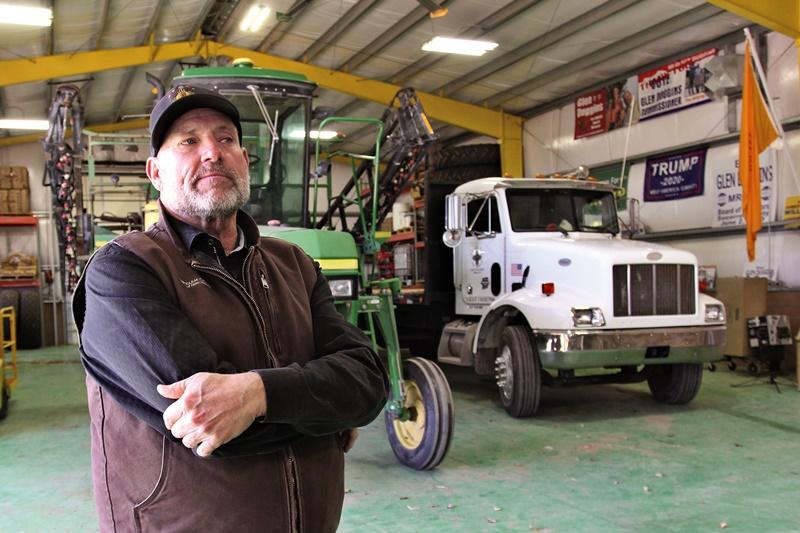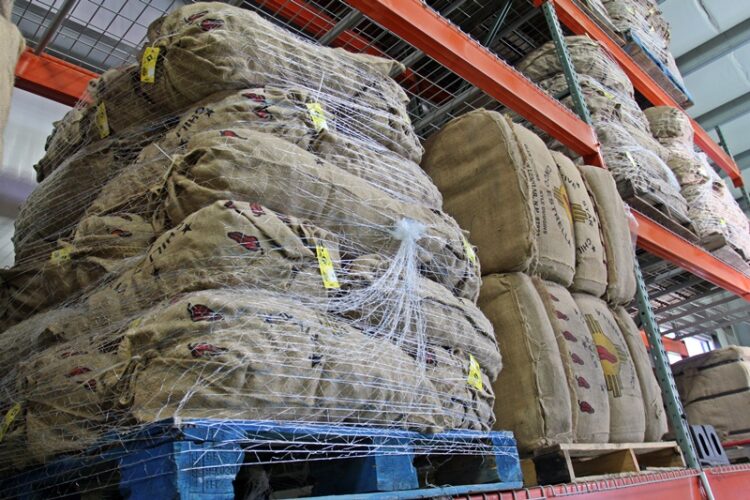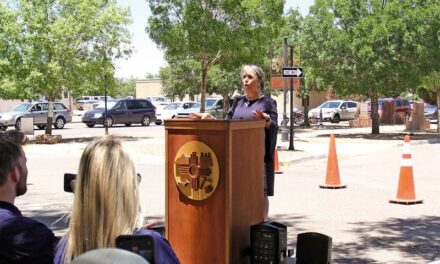
Glen Duggins contemplates quitting chile farming at his farm in Lemitar.
Cathy Cook | El Defensor Chieftain photos
Glen Duggins could be found Thursday afternoon trimming branches off a sapling in his front yard.
“I like my trees trimmed and up so you can walk under them.”
Duggins is a familiar face in the chile industry. He’s president of the New Mexico Chile Association, serves on the Middle Rio Grande Conservancy District Board and is a Socorro County commissioner.
Then there’s the award winning chile produced by his Cinco Estrella chile farm. Duggins has sold produce in grocery stores, to locals who want to pick their own, and he came home with the best green chile in the 2021 Great New Mexico Chile Taste Off.
Duggins has been farming for 39 years, 37 of which included chile farming.
Unlike many small New Mexico farms born of generations of farmers passing the property, skills and water rights down from father to son and mother to daughter, Duggins isn’t from a farming family. But he wanted to be a farmer growing up.
Chile helped him make the dream real.
“Before you knew it, in a few years, I was doing 1,000, up to 1,200 sacks every day,” Duggins said.
As a crop, chile is what grew his business. But for the last 15 years, profits from chile sales have declined and no longer outweigh the cost of growing chiles on his farm, so he’s calling it quits on chile.
“We got to today, to last year, these bales of sacks come in a thousand a bale. We opened one, and we never opened the other one. So somewhere, we were around a thousand sacks for the season.”
Duggins attributes the struggles to a shortage of labor, significantly cheaper chile from Mexico available in New Mexican stores, and declining interest in buying unprocessed chile.
“The stores have used chile, because it’s so popular, it’s so New Mexican, they’ve used it as a loss leader. Meaning, for years they would buy the chile say from me for $20. They might roast it for $17, losing money, but they’re getting hordes of people coming in the store, sell them the toothpaste while they’re there. And what that did was create a false market that I can’t live with, and neither could the mom-and-pop that used to be under the tree and out the garage that roasted chile, make a little vacation money. Well they folded because of the big stores.”
Duggins said he has doubled the pay offered to workers on his farm and still cannot find enough people to do the difficult work of picking chile.
“I bet if I said, these boys make, and they do, they might make $300 a day. It’s backbreaking work. The mosquito’s going to bite you, but $300 for unskilled work, that’s a good wage. That’s a good wage for anybody. Anyway, I bet they would be calling and coming … As soon as you say, we start at 6 a.m., well we just lost half of them.
“The other half they’re going to come, and they’re going to drive out to the chile field and look at it, these are people, they’re so disconnected, everybody is, anyway, some of them will turn around and never get out of the car and leave. Then you have the ones that stay right, come back at noon and see how many’s left. They won’t be.”

Sacks of Five Star Chile in Duggins’ barn.
Duggins believes the plight of chile farmers could be fixed through political action.
“I’m hoping that my stepping out of the business, the president of the Association can no longer do it, I’m hoping that will jar some minds.”
Talking about giving up chile farming long enough leaves Duggins teary-eyed. It’s been hard to give up on the crop, although finally making the decision to do so leaves him relieved.
Duggins has no plans to quit farming more broadly. Right now, his fields are growing hay, alfalfa and winter wheat. Come spring, he’ll plant corn in the fields behind his home in Lemitar. He may even sneak in eight rows of chile, but commercial chile farming is no longer an economic venture Duggins wants to take part in.
“The future of the chile is the frozen market, is the already processed market. I think these chile farms that are family-run stores, they have their own outlets, I think they’re going to be able to continue to go. I don’t think it will completely die, but even them, the generational thing is going to catch them, I believe. Who cans peaches today?”
He worries about the fate of chile farming in a state where chile is sacrosanct.
“I don’t think it’s going to completely die, but I do think it’s going to wind up with a few, little small farms that are more boutique. Then the rest will sell it to places like Bueno Chile and process it themselves for the frozen market.”
Duggins wanted to step down from his role as Chile Association president, but the board convinced him to stay. He’ll still be advocating for chile farmers at the state legislature and helping organize the third annual Great New Mexico Chile Taste-Off in Socorro this fall.























